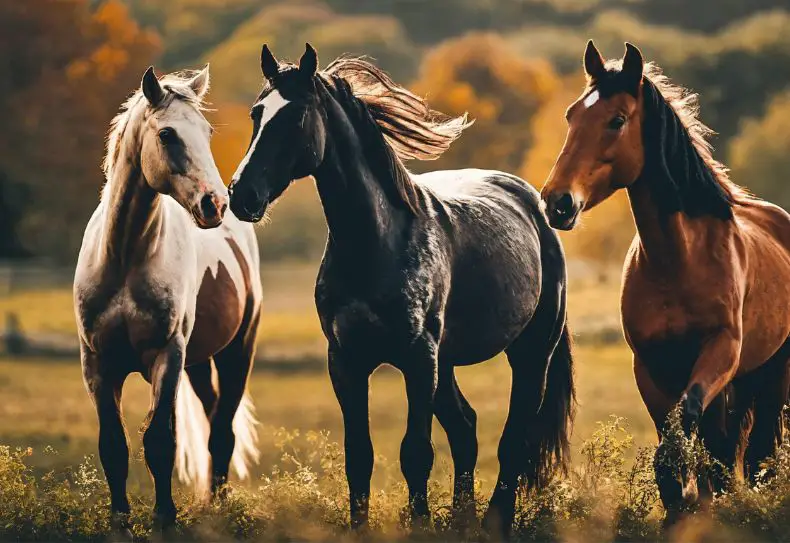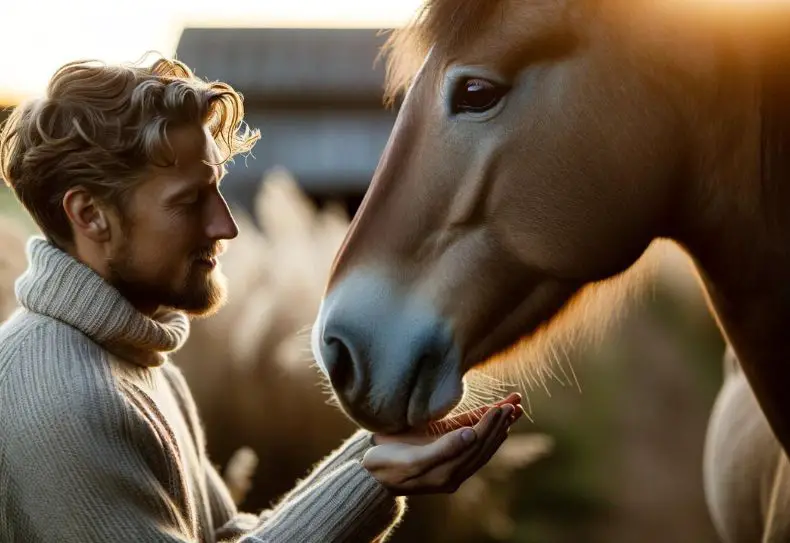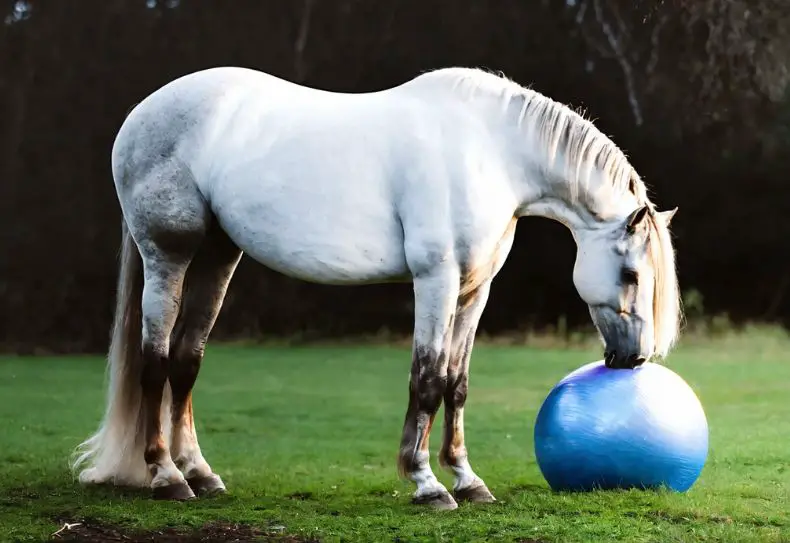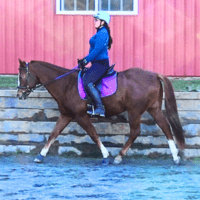When a horse licks you, it’s not just a random gesture. So what does it mean when a horse licks you?
It’s a way for them to communicate their feelings, needs, and desires.
In this article, we’ll explore the different reasons why horses lick and how to respond to their licks in a way that improves your connection with your horse.
Observing your horse’s body language and the context in which they lick can provide valuable insights into their intentions.
Disclosure: I am trying out using AI images and used in this post. Just wanted you to know.
About The Licking Behavior
When a horse comes up and gives you a lick, it’s not just about them trying to figure out if you taste like a giant salt lick. Nope, it’s packed with meaning, like a secret handshake in the equine world.
Just like your dog might wag its tail or your cat purrs when you scratch its favorite spot, horses show their fondness through licking. It’s their way of saying, “Hey, I dig you.” When a horse licks you, it’s sharing a bit of warmth and trust. It’s a gesture that says, “You’re alright in my book.”
Horses are social animals. They’ve got their own version of Facebook and Instagram, except it’s all about the physical interactions. Licking is like hitting the ‘like’ button or leaving a positive comment. It strengthens the bonds between them and us, building a bridge of mutual respect and understanding.
RELATED BLOG POSTS>> Are Horses Prey Animals Or Are Horses Predators?
Now, horses can’t chat over a cup of coffee, but they’ve got their own ways of expressing needs, desires, and feelings. A lick can be a horse’s method of exploring the world or saying, “I want a snack, got any treats?” It’s a part of their language, a piece of the conversation.
Possible Reasons For Licking

We just talked about some of the reasons why a horse may lick but now let’s go over all the reasons why horses might give you a lick. Understanding all the possible reasons can really open your eyes to what’s going on in their minds and help you respond in an appropriate way.
RELATED BLOG POST: Horse Flehmen Response Explained: Why Horses Smile!
Affection and Comfort
First off, when a horse licks you, it’s often their way of showing trust and contentment. It’s similar to a hug from a friend or a pat on the back. They’re saying, “I feel safe with you.” This kind of gesture is a big deal in the horse world. It’s not just about feeling good; it’s about expressing a sense of security and happiness in your presence.
Curiosity and Taste
Horses are naturally curious creatures. Their way of exploring the world often involves their mouth and tongue. Whether it’s a new object in their space or the salty taste on your skin after a workout, they’re gathering information. Think of it as their form of asking questions or trying out new things. It’s not much different from a toddler putting everything in their mouth to learn about their environment.
Boredom or Stress
Just like us, horses can get bored or stressed, and licking is one way they might cope with these feelings. If a horse’s environment lacks stimulation, or if they’re feeling anxious, they may lick objects or people as a way to distract themselves or find some comfort. Recognizing these signs can give you the incentive to make their lives more engaging and reduce their stress.
Health and Diet
Sometimes, a lick isn’t just a lick. It can be a signal that something’s off with their health or diet. Horses might lick to supplement deficiencies, like not getting enough salt or minerals. It’s their body’s way of trying to correct an imbalance.
On the flip side, excessive licking might point to issues like gastric ulcers, where the act of licking helps increase saliva production to soothe their discomfort.
Social Hierarchy
In the wild, horses have a clear social structure, and behaviors like licking play into this. It can be a way of establishing who’s boss (dominance) or showing submission within their group. By licking, they’re navigating their social world, figuring out where they and others fit within the herd’s hierarchy.
RELATED BLOG POST>> Why Horses Pin Their Ears Back! What They Are Signaling
The Importance of Observing Body Language and Context
Now, if you’re looking to truly grasp what your horse is telling you through its licks, you’ve got to play detective. Observing their body language in tandem with the lick can be very telling. Are their ears pinned back or forward? Is their stance relaxed or tense? These are pieces of the puzzle that, when put together, provide a clearer picture of their internal state.
Context is equally important. The surroundings, the timing, and what’s been happening in their day or life can influence why they’re licking. A lick in a calm, familiar setting might have a very different meaning from one that occurs in a new or stressful environment. It’s about connecting the dots between their actions and the situation at hand.
RELATED BLOG POST>> What It Means When A Horse Turns His Back On You & What To Do
Piecing It All Together
Grasping the horse’s perspective isn’t about translating each lick into a definitive statement. Rather, it’s about developing an intuitive understanding of their needs and emotions. By paying attention to the nuances of their behavior and the context in which they occur, you can better respond to and care for your equine friend.
This deep dive into their behavior strengthens the bond between horse and handler, fostering a relationship built on mutual respect and understanding. It’s a journey of learning and growth for both you and your horse, one that enriches the time you spend together.
Remember, each horse is an individual, with their own personality and ways of expressing themselves. By approaching them with an open mind and a willingness to learn, you’ll find that their behavior, including licking, becomes a language you can understand and appreciate more deeply.
How To Respond To Licking Based On The Reason

When your horse shows you affection through licking, it’s sharing a piece of its heart with you. Here’s how you can understand and respond to their licks, ensuring your reactions foster a positive relationship and address their needs effectively.
Affectionate Licking
When a horse licks you affectionately, it’s a sign of trust and comfort. Your response should be as warm as the gesture itself. Stay calm and offer gentle strokes or light scratches in return, especially around their neck or withers, areas they typically enjoy being touched. This reciprocal action reinforces your bond and communicates your affection back to them, fostering a cycle of positive interaction.
RELATED BLOG POST>> 9 Signs That A Horse Trusts You (What You Need To Know)
Licking Due to Boredom or Stress
If your horse is licking more out of boredom or stress, it’s a call to action for you. Here’s where you put on your thinking cap and get creative. Increase both mental and physical stimulation for your horse. Mix up their daily routine with new exercises or training games that engage their mind and body. Ensure they have plenty of social interactions, either with you or their equine pals. A socially rich environment can greatly reduce boredom and stress, making for a happier horse.
Health or Diet-Related Licking
Sometimes, licking is a horse’s way of telling you something’s not quite right with their health or diet. If you suspect this, the first step is to consult with a veterinarian to rule out any underlying health issues. Ensure their diet is balanced and meets all their nutritional needs. Consider adding mineral or salt supplements if they’re lacking, but always under the advice of a professional. This proactive approach helps address the root cause of their licking, ensuring they stay healthy and content.
In all cases, observing and understanding the reason behind your horse’s licking behavior is key to responding appropriately. Each horse reasons for licking can vary greatly. By paying close attention and adjusting your response to suit the specific reason, you’re showing your horse that you respect and care for them, deepening their trust in you.
Preventive Measures For Negative Licking Reasons And Tips

Dealing with a horse’s boredom or ensuring their diet and health are up to snuff doesn’t have to be a head-scratcher.
Here’s how you can keep ahead of these issues, making sure your horse is both happy and healthy.
For Boredom
Horses, much like people, thrive on engagement and variety. Keeping boredom at bay is key to maintaining their well-being and preventing behavioral issues. Here’s what you can do:
- Introduce New Toys: Just like kids, horses enjoy playing with toys. Offer them balls or other safe toys that they can push around or interact with. It can be a simple way to add some excitement to their day.
- Change Routines: Doing the same thing every day can get old fast. Mix up your horse’s routine by changing their exercise schedule, introducing different training exercises, or simply taking them on varied routes for their workouts. This keeps their mind engaged and curious.
- Ensure Adequate Companionship: Horses are social creatures. If possible, allow them regular interaction with other horses. This can be through shared turnout time or even just placing them in stalls where they can see and communicate with their neighbors. Social interactions are crucial for their mental health.
For Diet and Health
Maintaining your horse’s diet and health requires a proactive approach. Here’s how you can ensure they’re getting what they need:
- Regular Health Check-Ups: Schedule regular visits from your veterinarian to catch and address any health issues early. Prevention is always better than cure, and a professional can give you tailored advice based on your horse’s specific health profile.
- Well-Balanced Diet: Work with a nutritionist or your vet to ensure your horse’s diet meets all their nutritional requirements. This includes the right balance of vitamins, minerals, and other nutrients essential for their well-being. If necessary, supplement their diet with additional minerals or vitamins, especially if they’re showing signs of deficiencies.
Both sets of tips aim to prevent issues before they become problems, ensuring your horse remains healthy, happy, and engaged. Remember, each horse is unique, and what works for one may not work for another. Stay observant, be willing to adapt, and always keep your horse’s best interests at heart.
RELATED BLOG POST: Learn Why Your Horse Keeps Opening Their Mouth When Ridden
A Story: Unveiling the Layers Behind a Horse’s Lick
Let me tell you a story about a young lady named Emma and her horse, Eclipse. Emma had always felt a special connection with Eclipse, a spirited mare with a glossy black coat and a personality as bright as her name.
Lately, Emma noticed Eclipse licking her more frequently during their daily grooming sessions. Initially, Emma interpreted these licks as signs of affection, a testament to the bond she believed they shared.
However, as the days passed, Emma started to feel that something was amiss. Eclipse’s licks seemed to increase in urgency whenever Emma was slow in bringing her feed or when she attempted to end their grooming sessions. It was during one particularly long grooming session that Emma realized the truth.
Eclipse’s licks weren’t just expressions of affection; they were manifestations of impatience. The mare was communicating, in her own way, a mix of anticipation for her meals and a subtle nudge to hurry along with whatever task Emma was performing.
This revelation was a turning point for Emma. It dawned on her that, in her eagerness to interpret Eclipse’s behavior through the lens of human emotion, she had overlooked the mare’s more immediate and practical concerns.
Emma learned the importance of observing and understanding Eclipse’s body language in context, recognizing that her actions could be multifaceted and not always driven by affection.
The key takeaway from Emma and Eclipse’s story is the importance of not jumping to conclusions about our horses’ behavior.
Like Emma, we might be tempted to interpret their actions through a human-centric perspective, but it’s crucial to consider their natural instincts and immediate needs.
Horses communicate with us in many ways, and understanding the context of their behavior helps us respond more effectively to their needs.
This anecdote serves as a reminder that, in our interactions with horses, we must strive to understand the full spectrum of their communication.
Wrapping Up: Unlocking the Secrets of Your Horse’s Licks
Understanding the reasons behind a horse’s licking behavior is crucial for fostering a healthy and fulfilling relationship with them.
By paying attention to their body language, considering the context, and responding appropriately, you can strengthen your bond, address their needs, and create a more harmonious partnership.
Have you ever wondered what your horse was trying to tell you through their licks?
Take some time to observe your horse’s behavior and see if you can identify different types of licks and their underlying meanings.

